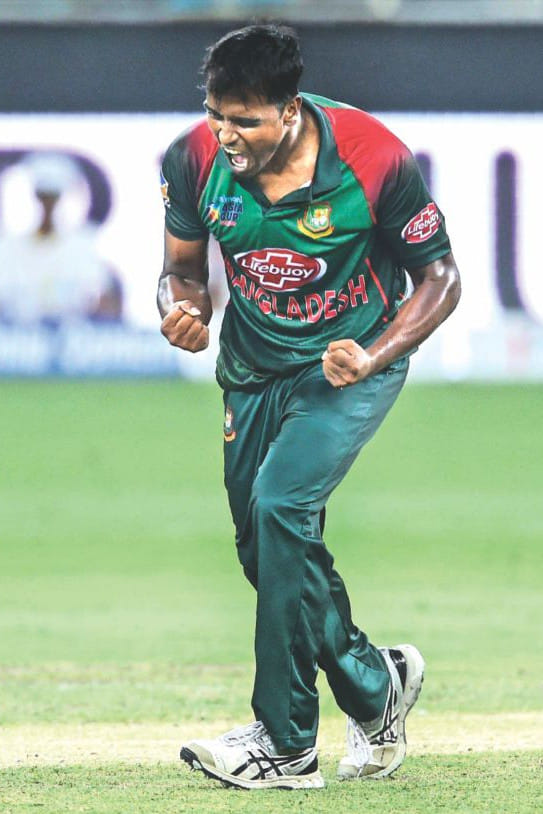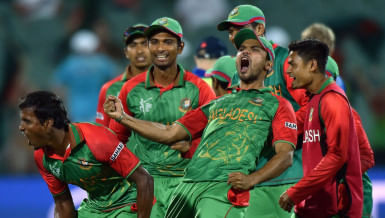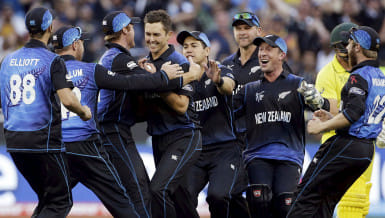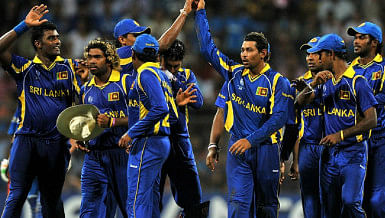Rubel Hossain is known for blowing hot and cold in a career spanning over a decade. Prone to err in the death overs, the right-arm pacer with a slinging action perhaps bowled his best ten overs in the one-day international against India in the Asia Cup final on Friday. His figures of 10-2-26-2 was a demonstration of how well he bowled in Dubai. He had Ravindra Jadeja caught in the 48th over, which was his last over, to create that window for a late twist in a pulsating final that Bangladesh lost off the last ball of the game.

Related Topics
Related News
The long wait is over. Bangladesh won a multi-nation tournament after six abortive attempts when they beat West Indies by five wickets at The Village in Dublin in an extraordinary final where the pendulum swung from one end to the other after rain intervened.
The rasping drive for four through the covers that Mahmudullah hit for the winning runs was icing on a proverbial celebratory cake that the Tigers had been preparing over their six previous attempts since 2009, somehow spoiled each time by their opponents.
The bitter memories of those near misses, marked by famously hysterical sobs, collective brain-freeze moments and emotional breakdowns that led to national catastrophe, transformed into a rainbow after rain for the Tigers in Malahide on Friday.
The success in their seventh attempt across the short formats of the game was more of a statement than just winning a tri-series final. It was a statement of consistency over the course of four years, a statement of evolving as a team under a true leader, where X-factors are not a big issue and a growing statement of youthful exuberance under the tutelage of the Big Five.
The win also served as a perfect build-up going into the World Cup, which starts on May 30. Although the fans are dreaming big after the tri-series win, a reality check is the need of the hour and would auger well for the Tigers to freely play good, hard cricket.
The next objective for the Tigers will be to play well in their two warm-up games against Pakistan and India on May 26 and 28 respectively before their opening World Cup fixture against South Africa at The Oval on June 6.
The best-case scenario would be to take one game at a time in their nine league matches. The batting looks primed to take the challenge of consistently hitting the 300-plus run mark, which promises to be a par score, if not quite safe, this English summer.
Yet, the biggest concern for the Tigers is that their bowling unit still left a lot to be desired. The challenge for the bowlers will be to take wickets in the first ten overs of the Powerplay to stymie the run rate, and also bowl smartly in the last overs when runs are expected to surge.
Bangladesh do not have a leg-spinner in their kitty. The Tigers are also running the risk of carrying one qualified left-arm spinner in Shakib Al Hasan, who missed the tri-series final due to a muscle spasm in his back. This might be a wake-up call for the Tigers thinktank to opt for a back-up left-arm spinner in a long league format.
Bangladesh also do not possess an express quick. Most of them are containers rather than aggressors, save Rubel Hossain. But the biggest headache for Bangladesh in the pace department has so far been the indifferent performances from Mustafizur Rahman.
The left-arm pacer, already famous for his slow cutters, has been struggling to regain his pace since a shoulder operation. He has been designed to take crucial wickets in the middle as well as to stop the avalanche of runs in the death overs.
The Tigers will be desperately looking for Mustafizur to return to his usual self by the time they take on South Africa and ‘The Fizz’ in rhythm will certainly hold the key to the Tigers winning more games than they lose in the league phase.
If they can do that the fans can only dream big. But at the moment the Tigers need to firmly put their feet on the ground before heading off to England to renew their World Cup ambitions, which ended in a quarterfinal defeat four years ago in Australia.
The morning of September 29 must have broken with some harsh light for the Bangladesh cricketers in Dubai and their loyal fans back home. It was much the same on March 23, 2012, when the Asia Cup final against Pakistan was lost in the final ball in Mirpur the night before. But as time wore on in 2012, the pain of defeat gave way to a feeling of accomplishment born from the feeling that Bangladesh cricket had finally broken through and had defeated all but one of their more celebrated neighbours before falling at the final hurdle.
On Friday night, the pain of failure at the final hurdle in the final ball -- this time against India -- haunted the cricketers and cricket lovers once again. Like 2012, this pain too shall pass but there will be a different sense of accomplishment from Asia Cup 2018.
Defeating Sri Lanka in the opener, then Afghanistan and Pakistan in must-win games may sound par for the course for the team fans have come to know since 2012. However, winning two of those matches without talismanic opener Tamim Iqbal and the one against Pakistan without both Tamim and ace all-rounder Shakib Al Hasan is not something that would have been expected. Making the final in the kind of heat they had never experienced before and doing it with setbacks that would have crippled Bangladesh sides of the past marks a new level.
To accomplish that, young players who were part of the support cast -- Liton Das and Mohammad Mithun -- and those who were leaders in waiting but often seemed to need a helping hand -- Mustafizur Rahman and Mehedi Hasan Miraz -- came to the fore. That, and the tremendous fighting spirit shown by the Tigers throughout the two-week long event -- not least in taking India's chase of 222 down to the final ball on Friday -- will be Bangladesh's biggest takeaway.
"Everyone may think about the 2012 Asia Cup final, but I see it a little differently," Bangladesh opener Tamim had said on September 13, two days before the tournament opener against Sri Lanka in Dubai. "The 2012 Asia Cup was the tournament where we first got the belief that we could beat any team -- that we could be competitive.
"I remember that; not my four fifties or how we lost the final by two runs. I remember how we played as a team and beat teams that no one would have thought we could beat. We beat India and Sri Lanka, and lost two very competitive matches against Pakistan."
Little did Tamim know then that it was his injury two days later, which forced him to fly out of the Asia Cup and back home, that would contribute to this tournament being remembered as the next big step for Bangladesh after 2012.
Since 2012, Bangladesh's graph has trended upward, with occasional dips. But a common feature of that rise has been the people doing the heavy lifting. Mashrafe Bin Mortaza, Shakib Al Hasan, Tamim, Mushfiqur Rahim and Mahmudullah Riyad have been the five cricketers who have worked wonders for Bangladesh cricket over much of the last decade.
But this Asia Cup was a departure from the norm because the Bangladesh team do not often do well with setbacks, especially when they have to fight with those setbacks against oppositions perceived to be superior. That happened in this tournament too -- losing the last group game against Afghanistan and the first Super Four match against India in abject fashion were a function of them struggling to overcome the setbacks of losing Tamim, scheduling confusions and having to play three matches in four days in 40-plus degree heat.
The recovery, and the architects of the recovery, will be the source of inspiration for future campaigns. While it is true that there was magical captaincy from Mashrafe, he still had to rely on opener Imrul Kayes to fly in on Saturday night and score a match-winning fifty against Afghanistan on Sunday from number six, rescuing the side in partnership with Mahmudullah from 87 for five. Faced with non-performing opening pairs, Mashrafe took the wildcard decision to open with number eight batsman Mehedi in the final, but the youngster still had to show the courage to be a part of a 120-run opening stand with a sublime Liton. For his part, Liton was the one who had to repay his captain's continued faith, and he did so with a maiden century in the most important game of the tournament.
Mushfiqur was Bangladesh's best batsman in the tournament with scores of 144 in the opening game and 99 against Pakistan. In both those innings, however, Mithun was an indispensable foil with innings of 63 and 60 in century-plus partnerships that rescued Bangladesh from top-order collapses.
In each of Bangladesh's three wins in the tournament, someone other than the Big Five stepped up and took responsibility. The bowlers, led by Mashrafe, Mustafizur and Mehedi, were consistent throughout and the spirited fielding was the flag-bearer of the team's never-say-die spirit.
"The positives depend on the individuals. I think losing to India twice was something that I didn't desire. When Shakib and Tamim are back, the team will do well in the future if we can hold on to this spirit," Mashrafe said after the match.
There will certainly be heartbroken fans who will rue another missed opportunity, another last-ball failure. But this tournament showed that the ingredients long craved for outside the Big Five are very much present and the work in progress is waiting for completion with the return of the two big stalwarts.
The takeaway from this latest heartbreak is that it will just be a matter of time before bittersweet gives way to unadulterated joy.
After an agonising defeat in the final of the Asia Cup against India in UAE on Friday night, the Bangladesh cricket team returned home last night with heads held high.
Mashrafe Bin Mortaza and his troops fought till the last ball of the match defending a small total of 222, but ended up as runners-up once again.
It was a mixed bag for the Tigers in terms of performance and there were a lot of incidents on and off the field, making the competition a memorable one.
It started with Tamim Iqbal's return to bat with a finger injury and defending a Suranga Lakmal delivery against Sri Lanka in the opening game where the left-hander left the field early after suffering a blow to his left hand knuckle against the same bowler. Tamim's bravery was praised worldwide.
Mushfiqur Rahim smashed a magnificent hundred with a fractured rib in the same game before scoring 99 against Pakistan while Shakib Al Hasan's departure from the tournament following a finger injury ahead of the Pakistan game made matters more desperate for the Tigers.
Tigers' next assignment will be the upcoming home series against Zimbabwe later this month featuring three ODIs and two Test matches.
The Zimbabwe series will be followed by another home series against West Indies in November where they will play two Tests, three ODIs and three T20Is.
"We have two home series and the New Zealand tour. We have a lot of work to do in the next two series, where we will have to play well," Mashrafe told reporters after the defeat in the final on Friday.
The team management will also have to deal with the injury concerns of the senior members of the side ahead of the home series.
Performers, be they on stage, in front of television cameras or on the field of play, sometimes talk about 'love the mess' -- in other words revelling in the scenario when things spin out of control -- in order to survive the chaos. Bangladesh are certainly in a chaotic situation in the UAE in their Asia Cup campaign, and just before today's final against top-ranked India, skipper Mashrafe Bin Mortaza seemed to have started embracing the bedlam.
"In this tournament we surprised ourselves and you folks as well. There were different players at different times in different positions," Mashrafe laughed as he answered a reporter's question about team composition. "Anyway, it was more to do with being a victim of circumstance. With Shakib [Al Hasan] not there, you might see someone [opening the batting] tomorrow who has never opened. We are prepared for everything and I am also asking you to be prepared."
The Asia Cup has been a trial by fire -- or at any rate intense Middle Eastern heat -- for Bangladesh. They lost opener and highest run-getter Tamim Iqbal with a left-hand fracture after the first match, had to contend with confusion surrounding the group placements and scheduling that seemed to be a product of organisers favouring India, and then the loss of ace all-rounder Shakib Al Hasan.
While Mashrafe, always an upbeat person, at times cut a forlorn figure in the middle stages of the tournament when they lost abjectly to Afghanistan and India. But then, on Sunday in the three-run win over Afghanistan, things started improving even as they appeared to become more pear-shaped. Opener Imrul Kayes was flown in to bolster a weak opening partnership, but Mashrafe decided to bat him at number six for the first time in his life, and he scored 72.
On Wednesday, after Shakib was ruled out, Bangladesh still managed to win against Pakistan, having to play with a bowler less. Part-time medium pacer and the other opener flown in, Soumya Sarkar, made up for that handicap with a fine bowling performance and took a wicket, shockingly, with a bouncer.
Roles have been redefined and Mashrafe seemed to be revelling in the madness of it all.
Seen from a wide angle, this topsy turvy state has hardly come out of the blue. Tamim suffered the fracture in the 11th ball of the tournament against Sri Lanka. Even though he came back to the dressing room with his left arm in a sling, Mashrafe urged the opener to go out at number 11 to enable Mushfiqur Rahim to score as many runs as possible. Tamim had the gumption to follow the order and played a ball one-handed, contributing to the 137-run win.
That single bit of courage and flexibility seems to have infected the whole squad throughout a tournament of highs and lows.
"Frankly, when Tamim took the field with a broken hand, to me I had won the Asia Cup right then," Mashrafe said with a smile.
If he can keep embracing the chaos and thinking out of the box, there may actually be more to smile about today.
 For all latest news, follow The Daily Star's Google News channel.
For all latest news, follow The Daily Star's Google News channel. 









Leave your comments